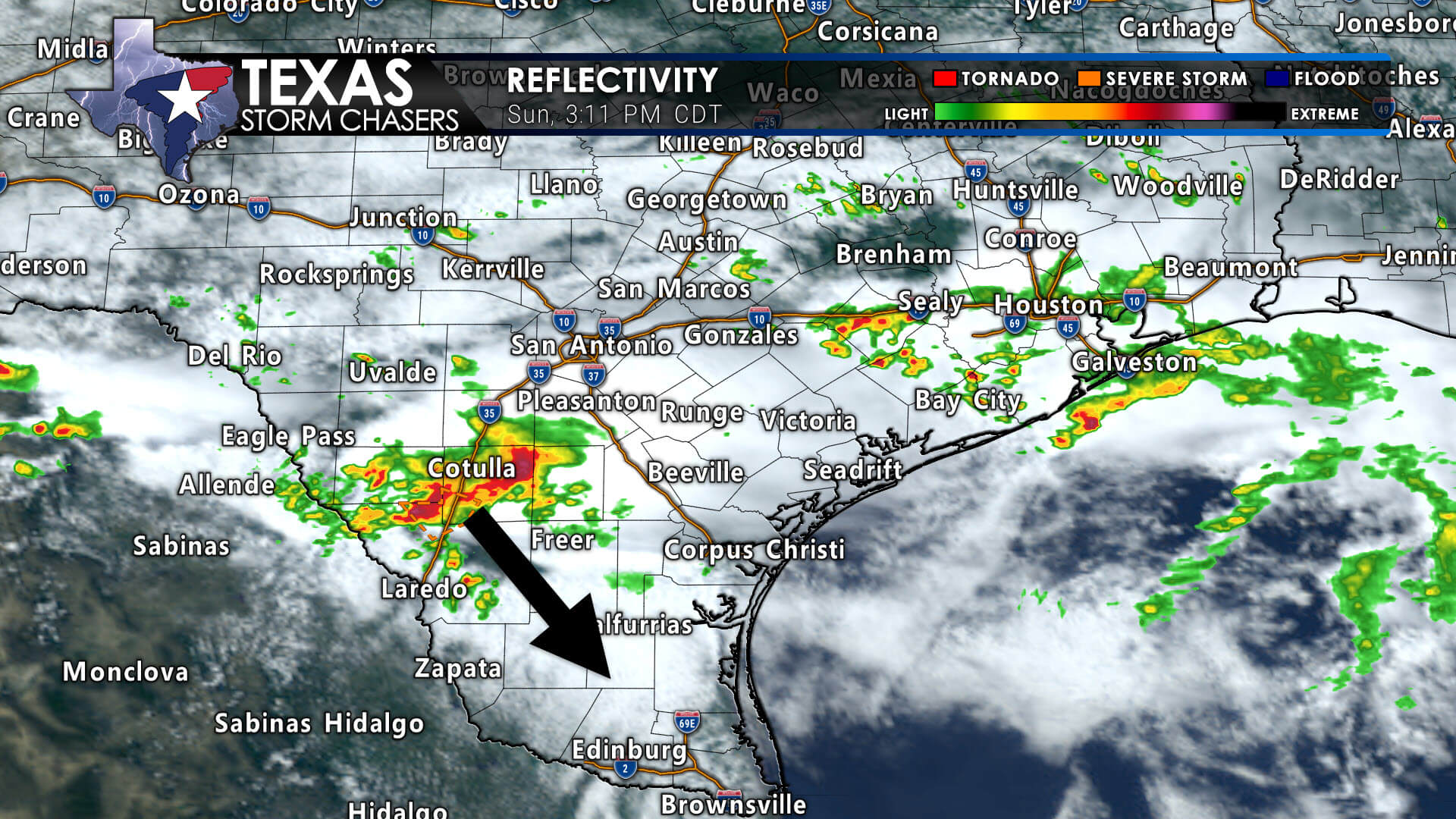NEW YORK — Donald Trump’s 2016 presidential campaign was repeatedly aided by the National Enquirer, which squelched potentially damaging stories about him and pumped out articles pummeling his rivals, the former boss of the supermarket tabloid testified Tuesday during the ex-president’s trial on charges of falsifying business records.
Washington
A secret pact at Trump Tower helped kill bad stories in 2016

On both fronts, prosecutors seemed to inflict significant damage. At one point, New York Supreme Court Justice Juan Merchan warned Trump lawyer Todd Blanche that he was “losing all credibility.” At another, Trump grimaced and shook his head as Pecker described how he helped kill an allegation — ultimately found to be false — that Trump had a child with a maid at his building.
The busy court day was punctuated by prosecutors detailing the full factual and legal foundation of their case against Trump, one built around a misdemeanor state charge of trying to illegally influence an election.
Pecker, the former CEO of American Media Inc., the company that once ran the Enquirer and other celebrity gossip publications, said he met with Trump and Trump’s then-lawyer Michael Cohen in 2015 to discuss how the tabloid, which had a long relationship with the real estate mogul and reality TV star, could help Trump’s bid for president.
“I said what I would do is I would run or publish positive stories about Mr. Trump, and I would publish negative stories about his opponents,” Pecker testified.
That wasn’t all he pledged to do.
Pecker said he told Trump: “I would be your eyes and ears. … If I hear anything negative about yourself, or if I hear anything about women selling stories, I would notify Michael Cohen as I did over the last several years.”
The deal Pecker described was a mutual back-scratching arrangement in which Cohen would feed stories to the tabloid about Republican rivals like Ted Cruz, and the paper would publish glowing stories about Trump. Pecker said he had a “great relationship” with Trump dating to the late 1980s, but that didn’t seem to be his primary motivation. Stories about the brash celebrity businessman helped sell copies of the tabloid.
“I needed the help,” Pecker said.
Prosecutors used the testimony by Pecker — who appeared cheerful and relaxed, and occasionally laughed as he testified — as a kind of guide into the world of celebrity gossip, backroom dealmaking and Trump’s secret fear that stories about his private life could damage his presidential bid.
Prosecutors say the 34 criminal counts at issue in the case — falsifying business records — grew out of the original idea of the Trump Tower meeting with Pecker: that Trump and his allies would find a way to “catch and kill” bad stories about him to protect him and his campaign.
Trump defense lawyer Emil Bove objected to some of Pecker’s testimony, arguing that the Manhattan district attorney’s office was trying to make legal conduct — meetings and discussions of celebrity gossip stories — sound like a criminal conspiracy, when Trump was not charged with any such conspiracy, and that the events described in testimony so far were not crimes.
Assistant District Attorney Joshua Steinglass said the prosecution’s entire theory “is predicated on the idea that there was a conspiracy to influence the election in 2016,” adding, “Mr. Bove may interpret some of the evidence in a way that’s different from the way that we interpret it.”
Under New York state law, falsifying business records is a misdemeanor, unless it is done to further or conceal another crime. Then it can be charged, as it was in Trump’s case, as a felony. Since indicting Trump, prosecutors have often been vague about what, exactly, was the underlying crime that was allegedly being concealed or furthered.
In court Tuesday, Steinglass said the statute in question is state election law 17-152 — conspiracy to promote or prevent an election. That law makes it a misdemeanor when two or more people “conspire to promote or prevent the election of any person to a public office by unlawful means.”
The defense and the prosecution did agree on one thing: Both sides expect continued disputes at trial over how much testimony about political figures, and political activity, should be presented to the jury. Trump is the likely Republican nominee in the November presidential election.
Manhattan District Attorney Alvin Bragg has charged that Trump falsified business records to conceal a $130,000 payment made ahead of the 2016 presidential election to adult-film actress Stormy Daniels, to prevent her from saying publicly that she had a sexual encounter with Trump years earlier.
Cohen later pleaded guilty in federal court to a campaign finance violation for arranging that payment and later getting reimbursed by Trump. Trump’s lawyers say their client was unaware of the particulars of how Cohen made the payment and was not part of any criminal pact.
Throughout most of the trial Tuesday, Trump was attentive as Pecker described their relationship.
Pecker recalled buying the rights to a doorman’s claim that Trump had a child outside his marriage — a claim that Pecker said was untrue but nevertheless could have damaged Trump’s campaign. The Enquirer paid $30,000 for the tale and kept it quiet until two months after the election, Pecker said.
Pecker is scheduled to be back on the witness stand Thursday — the trial is not in session on Wednesdays — and is expected to describe discussions with Cohen about other potentially scandalous stories involving Trump and women that they tried to keep from becoming public.
Cohen, a disbarred, convicted lawyer and admitted perjurer, is expected to testify in the case, and Trump has spent much of his time out of court publicly denouncing him — despite a gag order issued by Merchan barring him from making comments about witnesses in the case.
The trial resumed Tuesday with a hearing on the prosecutor’s request that Trump be found in contempt for at least 10 violations of the gag order.
Prosecutor Christopher Conroy asked the judge to remind Trump that “incarceration is an option” if he continues to violate the order. Some of the alleged violations occurred in the hallway just steps outside the courtroom.
“His disobedience,” the prosecutor said, “is willful, it is intentional.”
Trump has previously declared that he would be willing to go to jail over the issue of the gag order.
Trump “says whatever he needs to say to get the results that he wants,” Conroy said. “He’s doing everything he can to undermine this process. It has to stop.”
Prosecutors have asked the judge to impose a $1,000-per-violation fine for the statements.
Blanche, Trump’s lawyer, argued against punishing his client, saying he is a presidential candidate who has to be allowed to respond to political attacks, even if those attacks come from Cohen. He also said social media posts that repost what others say are not a violation of the gag order.
Unimpressed, the judge asked what legal precedent he could cite for that argument.
“We don’t have any case law to support that, but it’s just common sense, your honor,” Blanche replied.
As the hearing wore on, Merchan grew more impatient with what he said were Blanche’s vague and nonresponsive answers.
“You’ve presented nothing. I’ve asked you eight or nine times, show me the exact post he is responding to. You’ve been unable to do that even once,” Merchan said.
“Mr. Blanche, you are losing all credibility,” the judge said. “You’re losing all credibility with the court.”

Washington
The homeless in Washington state scatter as cities ban them from public spaces
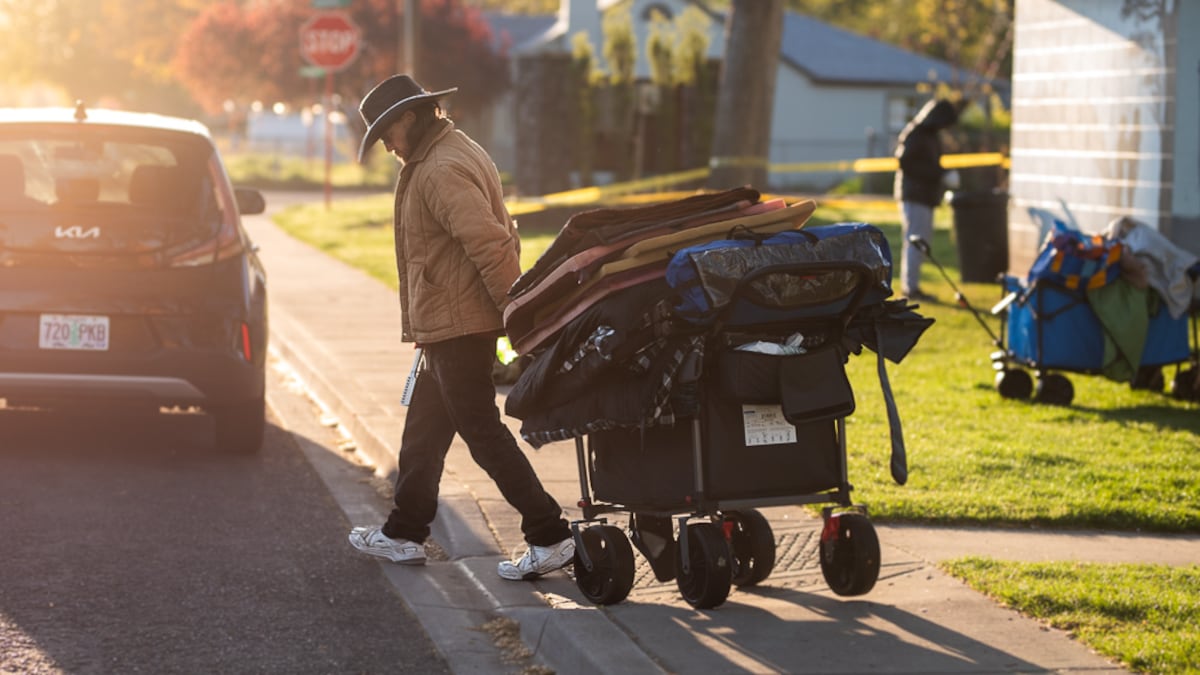
Every morning, John Parke packs up his tent and sleeping bag, piles them onto his wagon, and hauls all of his belongings off the grass at Foster Park, before the sprinklers go off at 8 a.m.
Whitney Bryen / InvestigateWest
John Parke, known as “Cowboy,” is always ready to pack up and move. He stacks his black and blue tent, foam sleeping pad, and flannel-lined sleeping bag on top of a wagon that he hauls away every day at 7 a.m. before police arrive and order him and the other unhoused people of “camp town” to leave.
Moving has become part of Parke’s morning routine. He had to move when officials in Clarkston, a small town in southeastern Washington on the Idaho border, closed the park where he was living in October. He moved days later when the city erected fences around another park where he was preparing his shelter for winter. And he moved again when the mayor declared 75 people at an encampment behind Walmart a “state of emergency.”
Now, the 45-year-old has to move every day so police won’t ticket him.
“They’re making it harder to get a job and improve our situation,” Parke said. “They’re acting like bullies at school, and I’m not going to let them do that, so I’m standing up for the homeless community.”
Washington state leaders highlight progress on homelessness, worry about cleanup funding
The city of about 7,000 recently restricted tents and other make-shift shelters used by unhoused people like Parke to one city park between the hours of 9 p.m. and 7 a.m. and prohibited personal belongings that are “not essential to living.” Parke is part of an ongoing lawsuit against Clarkston arguing the ordinance is unconstitutional.
Smaller Washington cities like Clarkston are increasingly confronting the housing crisis more commonly associated with densely populated, urban areas.
That could be a preview of what’s to come, not just in Washington but nationwide, following a U.S. Supreme Court decision expected in June. Justices are considering whether to overturn lower-court rulings in Oregon and Idaho that protect homeless people from being ticketed, charged or arrested for sleeping on public property when there is no shelter available.
In the past year, at least five Washington cities and two counties responded to increased homeless populations with camping bans. In addition to Clarkston, the Northwest Justice Project, which provides free civil legal assistance to low-income people in Washington, recently sued two other cities, challenging the constitutionality of homeless restrictions.
Cities contend that these laws are necessary to control encampments, which are unsafe for inhabitants, the general public and the environment. In a petition asking the U.S. Supreme Court to weigh in, cities said they’re paralyzed by federal court rulings in Boise, Idaho, and Grants Pass, Oregon, that presume “temporary shelter beds are the solution to homelessness, channeling local resources away from longer-term solutions like permanent supportive housing, mental healthcare, drug rehabilitation, and low-income housing support.”
Civil rights attorneys said barring people from using tents or shelters on public property isn’t the answer either.
Those laws have forced unhoused people to scatter across the state. Where there are camping bans, constant movement becomes overwhelming for people without permanent shelter. Many seek refuge on public lands outside city borders and in nearby communities causing homelessness to spike there, often overnight. That’s what happened when the city of Lewiston, Idaho, banned camping in 2022, sending many of its unhoused residents across the bridge and into Clarkston.
John Parke and Tiffany Deen are among about 20 unhoused people who regularly sleep at Foster Park, the small space in the center of Clarkston that the city designated for camping.
Whitney Bryen / InvestigateWest
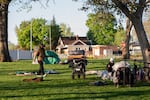
Howard Belodoff, the Idaho Legal Aid attorney who won the case against Boise, said a reversal would unleash cities to pass and enforce homeless bans.
“If they reverse it, every podunk town is going to take these ordinances criminalizing the homeless and adopt them,” said Belodoff. “These smaller cities have been trying to fly under the radar, but a reversal, well, they’re going to feel empowered to do it out in the open.”
Martin vs. Boise fallout
Since confining camping to a small park in the center of town in February, Clarkston’s “camp town” dwindled from 75 to about 20 people. One group set up a new camp in a wooded area about 20 miles northwest of town. Some walked back across the bridge to Lewiston. Others haven’t been seen in months.
A similar pattern has been playing out across the Northwest since the 2018 Martin vs. Boise ruling sided with homeless people who were cited by police in Idaho’s capital city when there were no shelter beds available. It was deemed cruel and unusual punishment.
Since then, cities have sought new ways to regulate homelessness, restricting when and where people could camp, sleep, lie or sit. Homeless advocates argue the restrictions make it more difficult for unhoused people to survive. Grants Pass, a city of fewer than 40,000, fined homeless residents for having blankets and pillows in public parks despite a shortage of shelter beds. A group of unhoused residents sued the city and, in 2022, an appellate court expanded protections for homeless people to include civil penalties.
Last year, Seattle and Spokane joined more than 20 cities, counties and organizations asking the U.S. Supreme Court to overrule those verdicts and give municipalities more authority to decide how to respond to homelessness. The Supreme Court heard arguments last week and is expected to make a ruling this summer.
Vancouver’s homeless shelter ambitions hit roadblocks with Clark College
Some cities have ignored the rulings, citing and arresting people even when there was no available shelter. Others, instead, ticketed homeless people for disorderly conduct or urinating in public. Some identified loopholes like environmental protections to support prohibitions.
With a Supreme Court decision still pending, Washington cities have continued to pass restrictions. Yakima County in south-central Washington has been removing abandoned encampments along the Yakima and Naches rivers for years. In July, commissioners adopted a policy against the advice of the county prosecutor allowing for the removal of inhabited camps, too.
Last summer, council members in Everett, 30 miles north of Seattle, banned resting or placing items such as a blanket within two blocks of behavioral health, addiction or emergency housing services.
In November, the Vancouver City Council closed an additional 48 acres of public property to camping. The following day, the Clark County Council banned camping near bodies of water, in parks and natural areas, prohibited daytime camping, and restricted storage of personal property.
As these homeless bans spread into the suburbs or smaller cities in Washington like Clarkston, civil rights attorneys said some are violations of the Martin vs. Boise ruling.
Many of those smaller cities don’t have overnight shelters. And those that do can’t keep up with the need. In Washington, people in temporary or emergency housing or without shelter have increased 52% in a decade, according to state estimates. In 2023, on a single night, that number exceeded 28,000, which is generally considered an undercount.
Rents are rising in every corner of the state, not just in the Puget Sound region, pricing low-income residents out, said Tedd Kelleher, housing policy director for the Washington State Department of Commerce.
“For people in the margins, the math that worked for them five years ago doesn’t work for them anymore,” Kelleher said. “It’s making it harder and harder for them to stay inside.”
Unhoused residents of Burien are challenging an ordinance passed in March by City Council members banning daytime camping in the Seattle suburb. The ban on daytime shelters also is part of Parke’s claim against Clarkston.
One of Clarkston’s City Council members refused requests from InvestigateWest for an interview. The others did not respond. In its ordinance, city officials justified the restrictions by citing “unsafe and unsanitary conditions” at encampments that pose a threat to the community.
Jennifer Graham, who grew up in Clarkston in a small, white house kitty-corner from Foster Park, said her daughter’s family, who now live there, can no longer enjoy the playground across the street at Foster Park. That’s the half-acre park where residents of “camp town” were forced to move in February after City Council members made it illegal to camp anywhere else.
“None of the kids in the neighborhood can play in the park because we’re not sure if there are needles lying in the grass,” Graham said. “And the kids that have gone over to try to play, they get hollered at by the homeless people.”
Graham started a Facebook group in March where she posts calls to Clarkston police about Foster Park, arrest reports, pictures and videos meant to persuade city leaders to bar camping from all parks. Rather than a shelter, she supports a community court system that would offer beds at mental health and addiction treatment centers for those who need it. And jail for those who refuse to comply.
An ordinance passed in February designated Foster Park as the only place for overnight camping in Clarkston and made it illegal to have a tent or temporary shelter set up between the hours of 7 a.m. and 9 p.m. Since then, police have issued 11 citations for trespassing at the park.
Whitney Bryen / InvestigateWest
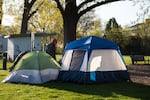
John Wolff, an attorney with the Northwest Justice Project who represents Parke and three other unhoused people, said Clarkston has as much of an obligation to his clients as it does to other residents. Attorneys on both sides are gathering evidence before arguing their case.
“My clients are all from Clarkston. They have families from there, and they deserve to be there, too,” Wolff said. “All they’re trying to do is assert their rights to basic survival that any human has the right to.”
A shrinking map
Parke’s breath turned to fog as he tugged on the strap that secures his tent to the top of his wagon on April 19. A nearby voice yelled, “Seven a.m. Everybody better get up!”
People sleeping in Foster Park have been cited by police if their shelters aren’t taken down by 7 a.m. Clarkston police have issued 11 trespassing citations at the park since the restrictions were passed, according to police records. Police cited seven people at 7:18 a.m. on March 11 — the day after clocks rolled forward one hour for daylight savings.
Even worse for some is the 8 a.m. deadline. That’s when the sprinklers come on. The park remains closed until noon, and tents and other temporary shelters are prohibited until 9 p.m.
But the city had some suggestions about where members of the encampment could relocate outside city limits: Hard-to-read black-and-white maps were handed out to residents, housed and unhoused, at a Feb. 6 meeting where the city acknowledged its lack of shelters. Hand-drawn black lines and barely visible computer-generated shapes encircled areas that the city said were available for camping. Many were along the river and managed by the U.S. Army Corps of Engineers, which quickly closed those areas to prevent overnight camping.
“We’ve identified multiple public properties in the area that we believe also fall under the auspices of Martin vs. Boise,” City Administrator Steve Austin said at the meeting. “Those are properties in Idaho, properties in Washington that anybody that does not have a home is able to reside on without criminal prosecution.”
Parke has been cited twice for trespassing. Both times, he said he overslept. Both of Parke’s citations are misdemeanors that could carry up to 90 days in jail and a $1,000 fine, a major setback as Parke works toward financial and housing stability. He won’t know the consequence until he goes back to court next month. He worries he will end up back behind bars due to his past mistakes.
Since camping and shelter restrictions were passed, Clarkston’s homeless encampment has dwindled from 75 people to about 20. Those who remain are forced to move their belongings, creating piles of supplies in an alleyway near Foster Park.
Whitney Bryen / InvestigateWest
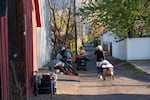
In the late ‘90s, Parke began using methamphetamine to dull the symptoms of his undiagnosed mental illnesses, contributing to 20 years of criminal charges for bounced checks, driving violations, drug possession, failing to appear in court, unpaid fines and felony domestic abuse.
Parke said his mental health took a dive about two years ago, and he again turned to drugs. He lost his job and his home and ended up on the streets. He’s sober now and receiving treatment for borderline personality disorder, post-traumatic stress disorder and manic depression.
“I let my mental health get the best of me. Hell, I let life get the best of me,” Parke said. “I’m trying to get back up and do the right thing and make it work, and it’s just, they’re making it harder and harder to improve my situation. Sometimes it’s hard not to give up.”
Clarkston’s ban sent some searching for a place to sleep across the river in Lewiston, Idaho, which barred sleeping in public more than a year before. Clarkston’s homeless population rose “drastically” after that, the mayor stated as part of the emergency proclamation adopted at the February meeting.
Vancouver, Washington, opens 3rd Safe Stay village for unhoused residents
Emergency shelter in the Lewis Clark valley is limited to youth and women who are victims of domestic abuse, volunteers said. Weeks after Clarkston’s restrictions went into effect, the Union Gospel Mission broke ground on a homeless shelter in Lewiston. But rules require residents to be sober and complete daily chores, and they prohibit co-ed housing, excluding many in need. Other attempts to build a shelter in Lewiston have failed due to public opposition.
On a corner overlooking Foster Park is First Christian Church, home of the Red Door Kitchen, which serves seven free meals a week. Its pastor, David Carringer, said he invited the mayor, City Council members and police to attend one of the meals. No one accepted the invitation.
“No one wants these people, so someone complains and they’re passed on to the next, and then they complain and they’re passed on again, and it’s a cycle,” Carringer said. “Instead of trying to come together and compromise, we’re pitted against one another, and the poorest always lose.”
Waiting for a decision
City camping bans, legal challenges, and the fate of people like Parke hinge on the decision of nine Supreme Court justices.
Last week, the court heard from both sides. Asking for a reversal of the Grants Pass decision, the city’s attorney argued that the previous ruling was too vague and hampered cities that need camping laws to protect public health and safety. The opposing attorney argued that those laws punish people for being homeless and “turn the city’s homelessness problem into someone else’s problem” by forcing them into other jurisdictions.
Justices are expected to rule in late June, near the end of the session.
Like the U.S. constitution, Washington’s constitution protects people against cruel and unusual punishment. It also contains a provision protecting people’s right to travel. Carrie Graf, an attorney with the Northwest Justice Project, argued to the Washington Supreme Court in October that the town of Lacey violated that provision when it passed a law requiring vehicles being used as shelter to move every four hours. The court has not yet ruled on the case.
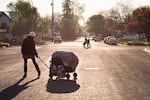
An ordinance passed in February designated Foster Park as the only place in Clarkston where people who are homeless can sleep at night, but people must move all of their belongings every morning before the sprinklers go off, or risk being ticketed by police.
Whitney Bryen / InvestigateWest
Graf said these and other provisions of the state constitution could insulate Washington from the fallout if the U.S. Supreme Court dismantles the 9th Circuit decisions.
While he waits for a local judge to decide his fate, Parke is applying for disability income. If that’s approved, he’ll apply for housing assistance. Until then, he’ll continue sleeping at Foster Park as long as the city permits.
“None of us want to be here, to be pointed at and laughed at and yelled at by people driving by,” Parke said. “The city put us front and center on purpose to create a circus and put us on display.”
Parke pulls his wagon toward an alleyway across from the park. The plastic tires on Parke’s wagon scrape against the gravel as he pushes it against a garage in an alleyway across from the park.
He makes three more trips from the park to the alley and back, each time with an armful of someone else’s belongings. Only a couple of tents remain when Parke glances up at the sun and mutters, “I hope it warms up soon.”
Surveying the grounds one more time, he crosses the street and takes a sip of Mountain Dew from a bottle he’d been toting around since the day before. He starts walking. He doesn’t know where he’s going, just that he can’t be there.
InvestigateWest (invw.org) is an independent news nonprofit dedicated to investigative journalism in the Pacific Northwest. Reach reporter Whitney Bryen at whitney@invw.org.
Washington
Zebra captured in Washington after a week-long search

Sugar the zebra is finally on her way home after escaping from a Montana-bound trailer in Washington last week.
On April 28, animal control was called on a report of four zebras wandering near Interstate 90 in North Bend, Washington. Officials said that with the help of good Samaritans, they captured three of the zebras within hours.
Regional Animal Services of King County said a fourth zebra, Sugar, managed to elude animal control. Throughout the week, Sugar was sighted numerous times in the Cascade Mountains community.
The Regional Animal Services of King County said Sugar was captured around 7 p.m. on Friday after being spotted just southeast of North Bend. Officials said Sugar appeared to be in good health.
Animals and Insects
Habitat loss for venomous snakes could attract them to unprepared parts of the world amid climate change, study finds
1:51 PM, May 04, 2024
The zebra was on its way to Montana after it was briefly kept in Washington.
“The four wayward zebras were embraced by our community the moment they jumped off the trailer at exit 32. I am honored to have had the opportunity to witness Sugar’s safe recovery this weekend,” said Mary Miller, mayor of North Bend. “Watching the coordinated effort to corral and secure the last remaining zebra was a quiet, calm, and very slow process. I am thrilled to be able to say firsthand that it was absolutely successful.”
Officials said the incident is under investigation and that citations are possible.
Washington
Cease-fire talks to resume in Cairo as Rafah offensive looms

Cease-fire talks are poised to continue Sunday against the tense backdrop of a looming Israeli offensive in the southern Gazan city of Rafah and worsening humanitarian conditions in the Palestinian enclave.
Hamas officials, in Cairo on Saturday for the latest round of talks, expressed hope that a deal could be reached to pause fighting, after months of on-and-off-again negotiations.
-

 World1 week ago
World1 week agoEU Parliament leaders recall term's highs and lows at last sitting
-

 Politics1 week ago
Politics1 week agoGOP lawmakers demand major donors pull funding from Columbia over 'antisemitic incidents'
-

 World1 week ago
World1 week agoHamas ‘serious’ about captives’ release but not without Gaza ceasefire
-
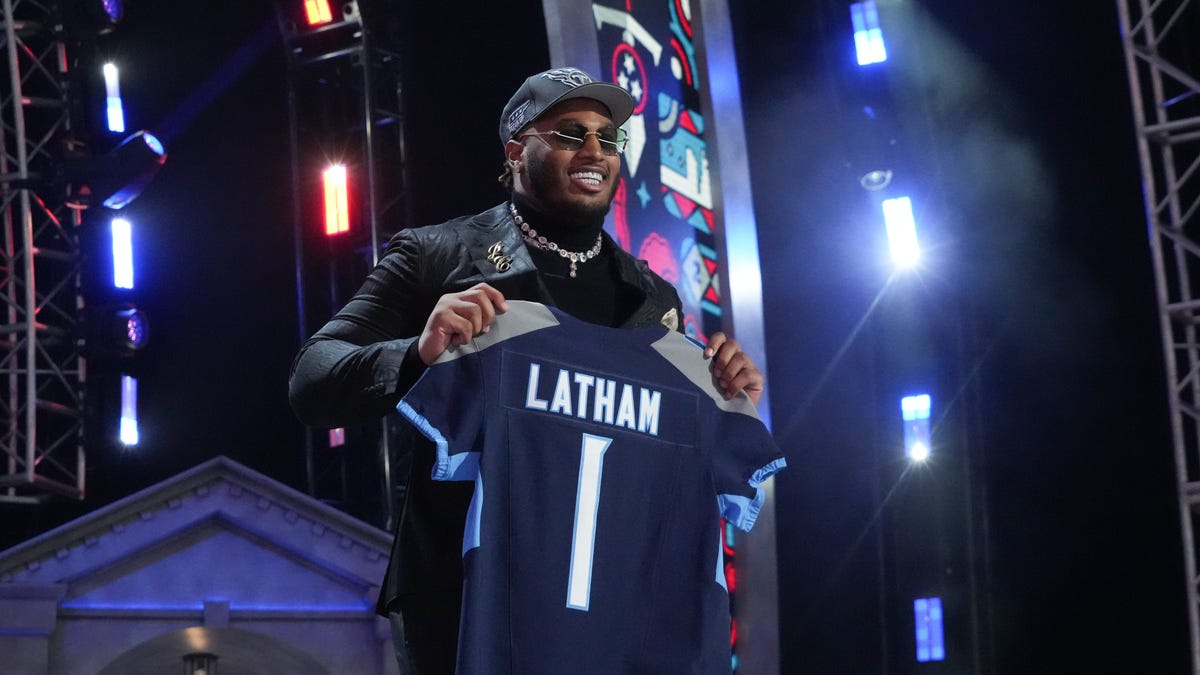
 Tennessee1 week ago
Tennessee1 week agoHow to buy JC Latham’s Tennessee Titans jersey after 2024 NFL Draft selection
-

 News1 week ago
News1 week agoBoth sides prepare as Florida's six-week abortion ban is set to take effect Wednesday
-
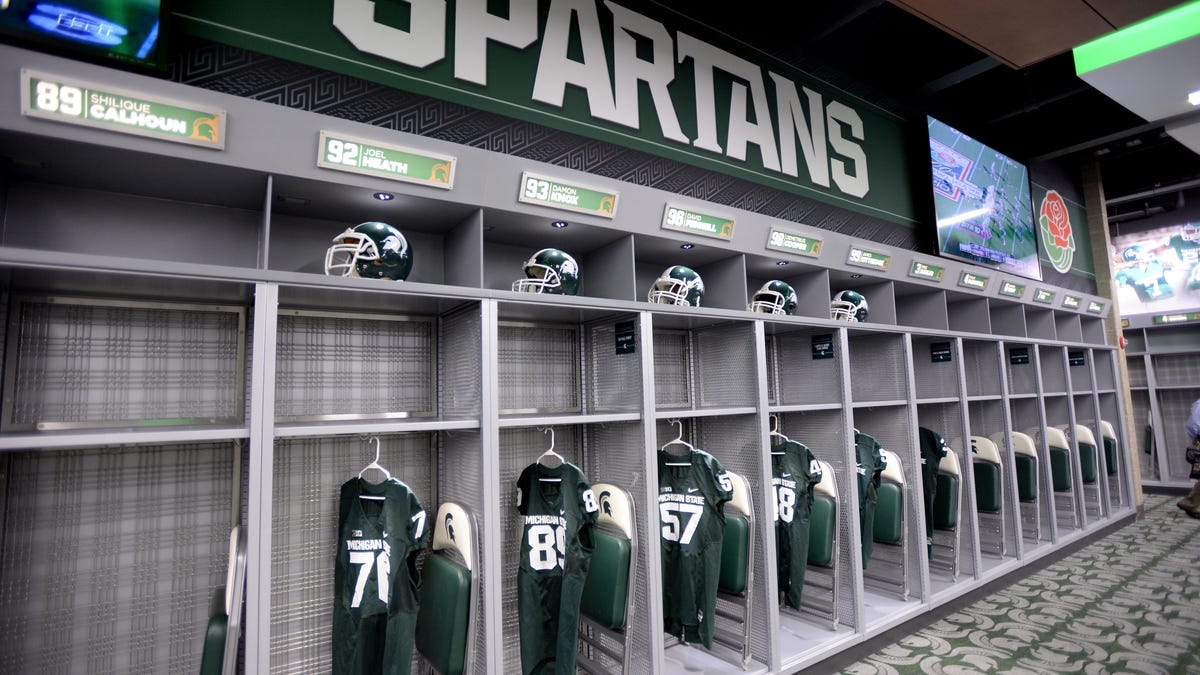
 Michigan1 week ago
Michigan1 week agoMichigan State football adds DT Brandon Lane from Stephen F. Austin
-

 Politics1 week ago
Politics1 week agoColumbia University’s policy-making senate votes for resolution calling to investigate school’s leadership
-

 Politics7 days ago
Politics7 days agoHouse Republicans brace for spring legislative sprint with one less GOP vote

